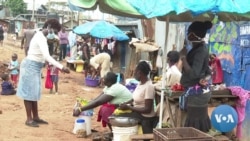In Nairobi's Kibera neighborhood, those who depend on day-to-day wages have been hit hardest by the economic impact of the coronavirus pandemic. While Kenya's government is providing some support, a local charity has formed to pick up the slack. The “Adopt a Family” campaign connects well-off Kenyan families with those less fortunate. So far, the initiative has connected more than 400 families, providing relief to many in desperate need.
Three months ago, 43-year-old Annete Okumu, a mother of six, was running a cake-making business on a busy street in Nairobi, and her husband had regular work as a painter.
Then Kenya’s minister of health announced the country’s first coronavirus case. Less than a week later, no one was buying cakes from Okumu, and her husband stopped getting jobs.
Okumu’s child, born with sickle cell anemia, started to get sick after several days of not taking medication.
“At this time, there is no food, there is no breakfast, there is no lunch, no supper for two days," Okumu told VOA. " I wondered what next? I am going to lose my kid? So when I saw Adopt a Family, it was late at night through social media, that’s when I decided, 'Enough is enough, let me speak out.’”
Annette called the number on the Adopt a Family’s Facebook page. Moses Omondi picked up the late-night call and asked Annette to meet him the next day.
Omondi says he started Adopt a Family after the Kenyan government issued a stay-at-home order in March.
“It led to many of the employers closing shop in order to adhere to the directives. There were people relying from hand to mouth-manual labor, most of them lost their jobs," Omondi said. "I sat and thought, what can I do that can adhere to the government directive, that’s when I thought, why can’t I look for a family who can support a family?”
On the night that Annete Okumu made the call to Omondi, Job Bitange, a video editor in Nairobi, was online reading about the Adopt a Family initiative.
Bitange reached out to Omondi the following morning and was connected with Annette Okumu. Soon, Okumu's family had their first meal in two days.
“I decided to support one family by giving them a voucher and he told me the voucher that I gave him was supposed to feed the family for one week, so come the second week I also gave him another voucher, and very many people came in because they knew I was part of the program because I was among the first people who joined his team," Bitange told VOA.
In less than three months, the initiative has connected 460 families from the slum to another 460 families who give them financial support.
In early March, following a stampede in Kibera that killed two people, the government said it would pilot a cash transfer program to help the most vulnerable members of society buy food during the COVID-19 pandemic.
Many Kibera residents say they have not received that cash, however.
Government representatives in Kibera say they are doing their best to help the needy during this time and that personal initiatives such as Omondi’s are important in “filling gaps.”
“The government also came up with the vulnerable persons in the community who get some support from the government itself, the aged, the orphans, widows and others like the bedridden," said Nehemiah Amwocha, the assistant chief of Gatwekera location in Kibera. "So far the government has done very well but you see we cannot do it alone, we need partners, this is where we say, the likes of Omondi are the best in the world.”
Apart from direct money transfers, Adopt a Family conducts food distribution drives for needy families. They also run a feeding program for children in the slum, where Annette now volunteers her time cooking.





